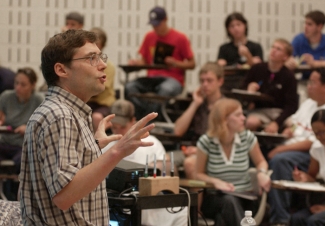Imagine high-school or college students so excited about physics they can hardly wait to get to class every day and learn more about how the world works. Fellow Carl Wieman recently offered cogent suggestions to new physics teachers on coming closer to this ideal. First, he recommended starting with research on how people learn physics and paying particular attention to the concept of "cognitive load." This concept, which posits that people can only process about seven ideas in short-term working memory, sets clear limits on how much information can be effectively introduced in a single lesson (or scientific talk).
Second, Wieman reminded teachers that they must connect new learning to students' lives and beliefs if they want to motivate students to learn new material. Third, he suggested listening to students to find out about their backgrounds and how they think. He said it's simply not possible to just pour understanding into students; rather you have to ask perceptive questions and eavesdrop on student discussions to figure out how to effectively guide student thinking toward a deeper understanding of physics.
Next, he suggested making students active partners in the learning process. When students understand the purpose of the class, what the teacher wants them to learn, and how the class is set up to accomplish these goals, they can become responsible partners in learning physics, often learning more and enjoying it! Fifth, Wieman recommended keeping the focus of the class on scientific reasoning and discourse – not on facts and formulas. Too many physics teachers have tried the opposite approach and succeeded in boring their students.
Finally, he said teachers must be flexible enough to abandon prepared lesson plans to pursue ideas raised by students or clarify points of confusion. Good teaching is about helping students learn to think and understand science. It's even a little like politics. No matter what you do, there will be students who dislike you and physics and others who love you. Wieman said his recommendations are the key to reaching the large, and often silent, majority of physics students.
Wieman's essay appeared in the "For the New Teacher" column in the April 2005 Physics Teacher. - Julie Phillips



 The Physics Frontiers Centers (PFC) program supports university-based centers and institutes where the collective efforts of a larger group of individuals can enable transformational advances in the most promising research areas. The program is designed to foster major breakthroughs at the intellectual frontiers of physics by providing needed resources such as combinations of talents, skills, disciplines, and/or specialized infrastructure, not usually available to individual investigators or small groups, in an environment in which the collective efforts of the larger group can be shown to be seminal to promoting significant progress in the science and the education of students. PFCs also include creative, substantive activities aimed at enhancing education, broadening participation of traditionally underrepresented groups, and outreach to the scientific community and general public.
The Physics Frontiers Centers (PFC) program supports university-based centers and institutes where the collective efforts of a larger group of individuals can enable transformational advances in the most promising research areas. The program is designed to foster major breakthroughs at the intellectual frontiers of physics by providing needed resources such as combinations of talents, skills, disciplines, and/or specialized infrastructure, not usually available to individual investigators or small groups, in an environment in which the collective efforts of the larger group can be shown to be seminal to promoting significant progress in the science and the education of students. PFCs also include creative, substantive activities aimed at enhancing education, broadening participation of traditionally underrepresented groups, and outreach to the scientific community and general public.